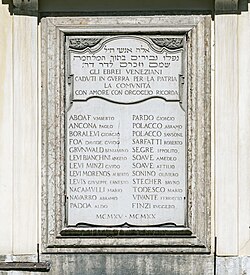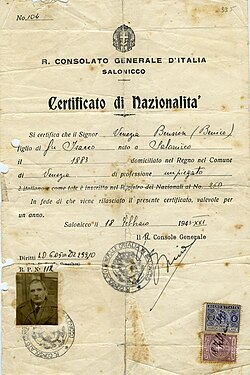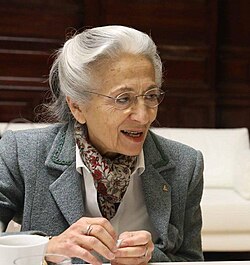
Italian Jewish surnames are those carried by people with Jewish ancestry in the territory of Italy, as well as in other territories where Italian Jews have lived, from the Ionian and Dodecanese Islands and the city of Salonica (Thessaloniki) in Greece, which includes the islands of Corfu (Kerkyra) and Rhodes, as well as Turkey and Israel.
History of Italian Jewish surnames and naming conventionsHistory of Italian Jewish surnames and naming conventions

In ancient Rome, men (apart from slaves) possessed inherited surnames, known as nomen, which was a clan name, and cognomen, which was a side-clan name. But by the Middle Ages, the custom of using multiple names had disappeared. Around 1450, the majority of Italians adopted hereditary surnames, a departure from the aristocracy, where surnames were typically patronymic or associated with manors or fiefs. Following the Council of Trento in 1593, parishes were required to register baptisms and marriages in order to prevent marriages between relatives. The Italian Jews started to received surnames around this time.[1] The Jews that arrived from Spain and Portugal following the Expulsion and the subsequent Inquisition arrived with surnames that have been using for centuries, as surnames began being used around the 10th century CE in the Iberian Peninsula regardless of their religion.[2]
Some Italian Jewish tombstones display the name of the departed first, followed by their given name, and then their father's name, which is indicated after the Hebrew word בן and the Italian di. For instance, Samuele Luzzatto, son of Giuseppe, may have had his tombstone read שמואל בן יוסף לוצאטו in Hebrew and Luzatto Samuele di Giuseppe in Italian.[3]
Italian Jewish surnames of Roman originItalian Jewish surnames of Roman origin

The majority of the Italian Jews are known as Italkim; they are thought to descend from the Jews who lived in Italy and especially in Rome during the Roman Empire. Their religious rites are distinct from their Sephardic and Ashkenazi brethren. The majority of the Italian surnames of Roman origin are derived from the names of towns in the vicinity of Rome, where the Italkim have been living for centuries, like the folllowing:
Some of their surnames are found in other languages associated with Jews, like Sacerdotti (priest), Diamanti (diamonds), Stella (star) and Gioia (Joy).
Italian Jewish surnames of Sephardic originItalian Jewish surnames of Sephardic origin

Southern Italy became home to a sizable Sephardi Jewish population after the Kingdom of Naples was placed under Spanish rule in 1442, when Alfonso V submitted Sicily and Naples to the Aragonese crown. However, many relocated to central and northern Italy after they were forced to flee Spain in 1492, Portugal in 1495, and the Kingdom of Naples in 1533. The Sephardic Jews were granted permission by the d"Este and Medici royal houses to settle in cities like Livorno, which became an important center of Jewish scholarship, as well as Ferrara, Modena, Pisa, Ancona as well as the Republic of Venice. Some of the family names associated with them are Almosnino, Corcos, Franco, Catalano, Galante, Gategno and Sarfati. Later, Portuguese "New Christians" began to arrive in Italy to return to their faith thanks to the religious freedom offered by the Maritime Republics, while avoiding the Papal States due to their condition of conversos or neofiti, in Italian. While some still used their old Sephardic surnames like Garton, Alhadeff, Aboab, Abravanel, Benghiat, Meldola, Canpanton and Attias, most retained the portuguese surnames they adopted when they were baptized: Dias, Fonseca, Senior, Lopes, Maduro, Mendes, Pinto and Rodrigues.[1]
Italian Jewish surnames of Ashkenazi originItalian Jewish surnames of Ashkenazi origin

The first Ashkenazi Jews arrived to Italy from France in 1394 and settled in the Piedmont; a little over a century later, Jews from Marseille reached Italy as well, while those coming from Austria, Poland and Germany mostly settled in Venice and Lombardy. Many of these surnames are of toponymic origin, indicating the city or town where the bearer came from. Some common Italian Jewish surnames associated with this community are:
Italian Jewish surnames of Libyan originItalian Jewish surnames of Libyan origin
There is a recorded Jewish presence in what today is Libya since the 3rd century BCE. Italy conquered Libya between 1912 and 1947, when the country achieved independence, most of them emigrated to Israel and a small number left for Rome. However, in 1967, and as a consequence of the Six-Day War, Colonel Muammar Gaddafi ordered the expulsion of all Italians colonists, settlers and Jews from Libya. The Italian Navy, through an airlift and the aid of several ships, helped evacuate more than 6,000 Libyan Jews to Rome in one month.[4] Today, around 4,000 Italian Jews live in Italy and are an integral part of the community. Some of the surnames associated with this community are:
Italian Jewish surnames of Sannicandrese originItalian Jewish surnames of Sannicandrese origin
Following World War II, approximately thirty Italians from the small town of San Nicandro Garganico who belonged to a Sabbatarian sect converted to Judaism.[5] While some of the converts still live in San Nicandro Garganico and particularly in the port city of Trani in Apulia, the majority of them emigrated to Israel after the establishment of the state and are primarily found in the cities of Birya and Safed. Usually, their surnames are Apulian, such as the following:
Italian Jewish surnames of Apulian originItalian Jewish surnames of Apulian origin
The Jews of Apulia, Calabria, and Sicily were referred to as "Italian Jews" prior to the Expulsion of the Jews from the Iberian Peninsula. While this designation was from a geographical point of view, Southern Italy was a part of Magna Graecia and remained under Greek cultural influence until 1071. As a result, the medieval Jewish communities of Southern Italy are regarded as Romaniote. The Jewish communities in these areas maintained contacts with their Romaniote coreligionists in Greece and Constantinople before migrating and assimilating to Corfu, Arta, Valona and Salonika[7] after the Spanish Inquisition reached Southern Italy, with the last Jews leaving Apulia in 1541.[8] Some of Apulian Jewish surnames reflect the dual Greek/Italian influence in their culture, like the following:
Italian Jewish surnames of patronymic originItalian Jewish surnames of patronymic origin
Derived from male ancestors' Hebrew or Italian names, sometimes ending in -i, -o, -ini, -ucci.
- Isaia – from Isaiah
- Mosè – from Moses
- Abram / Abrami / Abravanel – from Abraham
- Leone – from Judah the Lion or Leo
- Beniamino – “Benjamin”
- Giuda – “Judah”
- Rafaele / Raffaelli – from Raphael
- Angelo – from angel, or Angelus
- Jacopo / Giacobbe / Jacob – from Jacob
- Davide / De David – “David”
- Menachem / Menasce – Italianized from Hebrew
- Marino – “Marinus”
Italian Jewish surnames of noble, aristocratic and scholarly originItalian Jewish surnames of noble, aristocratic and scholarly origin
Some surnames became associated with scholarly dynasties, rabbis, or wealthy merchant families that were ennobled, like:
- Luzzatto – famous family of rabbis and writers (e.g., Moshe Chaim Luzzatto)
- Tedeschi – “the Germans,” used by Ashkenazim and scholars in Italy
- Di Segni – noble and rabbinic lineage
- Senigaglia / Sinigaglia – noble family of bankers, rabbis and industrialists whose origins can be traced back nearly 800 years
- Abarbanel / Abravanel – illustrious Sephardic family, some members settled in Italy
- Artom – prominent Italian Jewish scholars and politicians
- Ghirondi – rabbinic family from Padua
- Camondo – family of merchants from Venice, elevated to the rank of Count by King Victor Emmanuel II
- Mortara – from a family of rabbis (see the Edgardo Mortara case)
- Lumbroso – a family of rabbis, physicians and traders, some of which were raised to the rank of Baron by King Victor Emanuel II
Italian Jewish surnames of occupational originItalian Jewish surnames of occupational origin
There are a few Italian Jewish surnames that reflect trades, community roles, or religious positions (e.g. rabbi, cantor, scribe), such as:
Italian Jewish surnames of descriptive originItalian Jewish surnames of descriptive origin
Some Italian Jewish surnames reflect traits, characteristics, or abstract virtues, sometimes poetic or religious; some of these are common to Italian non-Jews:
- Buonaventura – “good fortune”
- Pacifici – “peaceful”
- Gentili / Gentile – “kind,” or “gentile” (non-Jew) ironically
- Felice – “happy”
- Sereni / Sereno – “serene”
- Forti / Fortunato – “strong / fortunate”
- Sermoneta – from a town, but also sounds like “sermon”
- Alfassi – “from Fez” (used poetically for wisdom, as many known rabbis came from Fez, in Morocco)
Famous people with Italian Jewish surnamesFamous people with Italian Jewish surnames

- Rita Levi-Montalcini, Italian neurobiologist, 1986 Nobel Prize in Medicine
- Moshe Chaim Luzzatto, Italian rabbi, kabbalist, and philosopher, better known by the Hebrew acronym RaMCHaL (or RaMHaL, רמח"ל)
- Primo Levi, Italian chemist, partisan, writer, and Holocaust survivor
- Yotam Ottolenghi, Israeli-British chef, restaurateur, and food writer.
- Carlo De Benedetti, Italian-Swiss businessman, engineer, and publisher, founder of the newspaper Domani and former owner of La Repubblica, L'Espresso, and La Stampa.
- Carla Bruni-Tedeschi, Italian-French singer, songwriter and former fashion model who served as the first lady of France from 2008 to 2012.
See alsoSee also
- Italian surnames
- Jewish surnames
- Sephardic Jewish surnames
- Roman surnames
- Italo-Albanian surnames
- Hebrew surnames
- Ligurian surnames
- Corsican surnames
- Venetian surnames
- Lombard surnames
- Friulan surnames
- Moroccan Jewish surnames
- Macedonian Jewish surnames
- Serbian Jewish surnames
- Spanish surnames
- Portuguese surnames
- Maltese surnames
- Sicilian surnames
- Sardinian surnames
- Ashkenazi Jewish surnames
- Bulgarian Jewish surnames
Explore more about Italian Jewish surnamesExplore more about Italian Jewish surnames
- Italy - Collection Catalog at MyHeritage
- Long Distance Italian Genealogy Research webinar at Legacy Family Tree Webinars
- From Venezia to Catania: the Basics of Italian Research webinar at Legacy Family Tree Webinars
- Italian Resources for Jewish Genealogy at JewishGen
- Italian Jewish Roots Surname Research
References
- ↑ 1.0 1.1 1.2 Neither Ashkenazi Nor Sephardi, Italian Jews Are A Mystery. The Forward
- ↑ On Sephardic Surnames. Hollander-Waas Jewish Heritage Services
- ↑ Patronymics. Italian Names. BYU Script Tutorial
- ↑ The Jewish Legacy of Libya. World Jewish Congress
- ↑ San Nicandro Garganico. Fondazione per i Beni Culturali Ebraici in Italia.
- ↑ The Jews-by-choice of San Nicandro, Italy. Shavei Israel
- ↑ Apulia, Italy. Jewish Virtual Library
- ↑ Puglia: A Land of Jewish Arrivals and Departures. Centro Primo Levi

